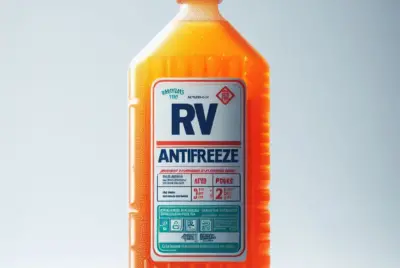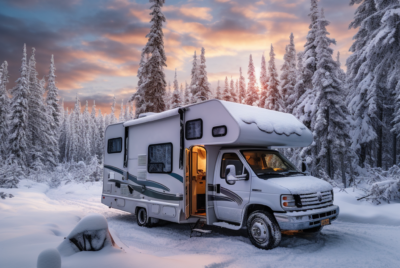How to Select an RV Power Inverter
As an avid RV camper, I understand the importance of having a reliable and efficient power supply during our trips. One crucial component that ensures a smooth and uninterrupted power flow in an RV is the power inverter. Let’s talk about the process of selecting the right RV power inverter, explaining the risks associated with making the wrong choice, and providing helpful suggestions to help you make an informed decision. So let’s dive in!
Understanding RV Power Inverters
 Before we delve into the selection process, let’s take a moment to understand what an RV power inverter is and what it does. Simply put, an RV power inverter is a device that converts DC (direct current) power from your RV’s batteries into AC (alternating current) power, which in turn runs the various appliances and electronic devices on board. This is especially useful when you’re not connected to a shore power source.
Before we delve into the selection process, let’s take a moment to understand what an RV power inverter is and what it does. Simply put, an RV power inverter is a device that converts DC (direct current) power from your RV’s batteries into AC (alternating current) power, which in turn runs the various appliances and electronic devices on board. This is especially useful when you’re not connected to a shore power source.
There are two main types of RV power inverters: pure sine wave inverters, and then there are modified sine wave inverters. Pure sine wave inverters produce a clean and smooth waveform that closely resembles the power you get from a traditional power outlet at home. Modified sine wave inverters will produce a waveform that is stepped, and that may not be compatible with some sensitive electronics. It’s important to consider this aspect when selecting an RV power inverter.
Power Requirements for RVs
To select the right RV power inverter, it’s essential to understand your power requirements. RVs typically have a range of appliances, including refrigerators, microwaves, air conditioners, and entertainment systems, that require power to operate. It’s crucial to consider both the continuous power and surge power requirements of these appliances.
Continuous power refers to the amount of power an appliance requires to operate continuously, while surge power refers to the additional power needed during startup or when the appliance experiences a sudden increase in power demand. Understanding these power requirements will help you determine the capacity and wattage your RV power inverter needs to handle.
Factors to Consider When Selecting an RV Power Inverter
Now that you have a basic understanding of RV power inverters and your power requirements let’s explore the key factors you should consider when selecting one.
Power Capacity and Wattage Requirements: Determine the total wattage you need by adding up the wattage ratings of all your appliances. It’s advisable to choose an inverter that can handle at least 10-20% more wattage than your total requirement to ensure optimal performance.
Waveform Type: Consider whether you need a pure sine wave inverter or you require a modified sine wave inverter based on the appliances you intend to use. If you have sensitive electronics like laptops or medical devices, a pure sine wave inverter is the safer choice.
Efficiency and Energy Consumption: Look for inverters with high-efficiency ratings, as they convert DC power to AC power more effectively. This can help reduce energy waste and prolong the life of your RV batteries.
Size, Weight, and Installation Considerations: RVs have limited space, so choose an inverter that fits well within your available space. Consider the weight of the inverter, as it may affect your RV’s overall weight capacity. Additionally, ensure the inverter’s installation requirements align with your RV’s electrical system.
Safety Features and Certifications: Opt for inverters with safety features built-in, like overload protection, short circuit protection, and low battery voltage shutdown. Look for certifications like UL (Underwriters Laboratories) or ETL (Intertek) to ensure the inverter meets safety standards.
Evaluating Inverter Options
With the essential factors in mind, it’s time to evaluate different inverter options to find the one that suits your needs. Research reputable brands and models are known for their reliability and performance. Read several customer reviews and ratings to get an idea of other users’ experiences. Compare prices and warranties to find the best value for your investment.
Sizing Your RV Power Inverter
To accurately size your RV power inverter, calculate your power needs based on the wattage requirements of your appliances and the expected usage. Keep in mind any future power requirements, such as adding new appliances or upgrading existing ones. It’s better to have some extra capacity to accommodate any potential changes down the road.
Installing an RV Power Inverter
Installing an RV power inverter requires careful consideration and adherence to safety measures. If you’re not familiar with electrical systems, it’s best to consult a professional for installation. However, if you’re confident in your abilities, follow the manufacturer’s instructions carefully. Ensure proper grounding, use appropriate cables, and take necessary precautions to avoid electric shocks or damage to your RV’s electrical system.
Maintenance and Troubleshooting
Regular maintenance is essential to keep your RV power inverter in optimal condition. Follow the manufacturer’s guidelines for routine tasks such as cleaning, inspecting connections, and testing functionality. In case of any issues, troubleshooting can help identify and resolve common problems. Be sure to consult the inverter’s manual or seek professional assistance when needed.
Enhancing Efficiency and Power Conservation
To maximize the efficiency of your RV power inverter and conserve power, consider adopting energy-conscious practices. Use energy-efficient appliances and LED lighting. Minimize idle power consumption by turning off appliances when not in use. Harness solar power by mounting solar panels on your RV’s roof to supplement your power needs. These steps can help you extend your battery life and reduce your reliance on the inverter.
Top 5 Best RV Power Inverter Brands and Models
Now that we’ve covered the key factors to consider when selecting an RV power inverter let’s explore the top 5 brands that have earned a reputation for their quality and reliability in the market. Each brand offers its own set of unique features and benefits, so you can select the best one for your specific needs.
Go Power!
Brand Description: Go Power! is a leading manufacturer of high-quality power solutions for RVs, including power inverters, solar panels, and battery chargers. They specialize in providing reliable off-grid power solutions for RV enthusiasts.
Top Model: Go Power! GP-3000HD
Description: The Go Power! GP-3000HD is a heavy-duty pure sine wave inverter with a power capacity of 3000 watts and a surge capacity of 6000 watts. It is designed to handle high-demand appliances and electronics with ease.
Unique Qualities:
Advanced Protection: The GP-3000HD features multiple built-in safety features, including overload protection, short circuit protection, and over-temperature protection.
Remote Control Capability: It comes with a remote control panel that allows you to monitor and control the inverter from a convenient location within your RV.
Easy Installation: The GP-3000HD is designed for easy installation, with clear instructions and user-friendly connectors.
Xantrex
Brand Description: Xantrex is a well-known brand in the power inverter industry, offering a wide range of inverters and power management solutions for RVs, boats, and off-grid applications. They are known for their reliable performance and innovative features.
Top Model: Xantrex PROwatt SW 2000
Description: The Xantrex PROwatt SW 2000 is a compact and lightweight pure sine wave inverter with a power capacity of 2000 watts and a surge capacity of 3000 watts. It is designed for smaller RVs and provides clean and reliable power for sensitive electronics.
Unique Qualities:
Digital Display: The PROwatt SW 2000 features a digital display that shows important information such as battery voltage, AC output power, and error codes for easy troubleshooting.
Automatic Transfer Switch: It comes with an automatic transfer switch that seamlessly switches between shore power and inverter power, ensuring a continuous power supply.
Ignition Control: The inverter can be connected to your RV’s ignition system, allowing it to turn on and off automatically based on the engine’s status.
Renogy
Brand Description: Renogy is a trusted brand in the renewable energy industry, specializing in solar power solutions for RVs, homes, and off-grid applications. They offer a range of reliable and efficient power inverters that work seamlessly with their solar panels.
Top Model: Renogy 2000W Pure Sine Wave Inverter Charger
Description: The Renogy 2000W Pure Sine Wave Inverter Charger is a versatile inverter with a power capacity of 2000 watts and a surge capacity of 4000 watts. It is designed to provide clean and stable power for a variety of appliances and electronics in your RV.
Unique Qualities:
3-in-1 Design: The inverter combines the functions of an inverter, battery charger, and automatic transfer switch into a single unit, saving space and simplifying installation.
Multiple Operating Modes: It offers various operating modes, including a silent mode for reduced fan noise and an eco mode for improved energy efficiency.
Battery Temperature Sensor: The inverter charger comes with a battery temperature sensor that optimizes charging performance and protects your RV batteries.
AIMS Power
Brand Description: AIMS Power is a renowned brand in the power inverter industry, known for their wide range of inverters and other power solutions. They offer reliable and efficient inverters for RVs, homes, and commercial applications.
Top Model: AIMS Power PICOGLF30W12V120VR
Description: The AIMS Power PICOGLF30W12V120VR is a powerful pure sine wave inverter with a power capacity of 3000 watts and a surge capacity of 9000 watts. It is designed to handle demanding power needs in larger RVs.
Unique Qualities:
Expandable Capability: The inverter features a built-in charger that allows for easy expansion of your RV’s power system with additional batteries.
LCD Display: It comes with an LCD display that provides real-time information about battery voltage, AC output voltage, and power usage for easy monitoring.
Automatic Transfer Switch: The inverter has an integrated automatic transfer switch that switches between shore power and inverter power seamlessly.
Magnum Energy
Brand Description: Magnum Energy is a trusted brand in the power inverter industry, specializing in high-quality inverters and power systems for RVs, off-grid cabins, and marine applications. They are known for their durable and efficient products.
Top Model: Magnum Energy MS2012
Description: The Magnum Energy MS2012 is a robust pure sine wave inverter with a power capacity of 2000 watts and a surge capacity of 4000 watts. It is designed to provide reliable and clean power for a wide range of appliances and electronics.
Unique Qualities:
Power Factor Corrected (PFC) Charger: The inverter features a PFC charger that efficiently charges your RV batteries and extends their lifespan.
Multiple Operational Modes: It offers various operational modes, including a battery priority mode, which ensures a constant power supply to essential appliances during power outages.
Easy-to-Use Interface: The MS2012 comes with a user-friendly interface that allows you to monitor and control the inverter’s settings easily.
Selecting the right RV power inverter is crucial for a comfortable and hassle-free camping experience. By understanding your power requirements, considering factors such as power capacity, waveform type, efficiency, and safety features, and evaluating different options, you can make an informed decision. Proper installation, regular maintenance, and implementing power conservation practices further enhance the efficiency and longevity of your RV power inverter.
Remember, investing in a reliable and high-quality RV power inverter not only ensures a steady power supply but also provides peace of mind during RV Camping.
FAQs
Can I use a regular power inverter for my RV?
While it may be tempting to use a regular power inverter, it’s not recommended for RVs. Regular power inverters are not designed to handle the specific power requirements and safety considerations of an RV. It’s crucial to use an RV power inverter that is specifically designed for the unique electrical systems and demands of RVs.
What is the difference between a pure sine wave and a modified sine wave inverter?
A pure sine wave inverter creates a smooth and clean waveform that closely resembles the power supplied by traditional power grids. It is compatible with almost all appliances, including sensitive electronics. A modified sine wave inverter generates a stepped waveform that may not be suitable for certain devices, especially those with sensitive components. It’s important to consider the appliances you intend to use and choose an inverter accordingly.
How do I determine the wattage requirements for my RV?
To determine the wattage requirements for your RV, make a list of all the different devices and appliances you plan to power. Check the wattage ratings of each item and add them all up to get the sum of the combined wattage. Be sure to account for both the continuous power and surge power requirements. It’s advisable to choose an RV power inverter with a capacity that exceeds your total wattage requirement by at least 10-20%.
Are there any safety precautions I should take when installing an RV power inverter?
Yes, when installing an RV power inverter, it’s essential to follow safety precautions. Ensure that the RV’s power source is disconnected before beginning the installation process. Use proper safety equipment like gloves and safety glasses. Double-check all connections and wiring to avoid any short circuits or electrical hazards. If you’re not confident in your abilities, consider consulting a professional for installation.
Can I run all my appliances simultaneously with an RV power inverter?
The ability to run multiple appliances simultaneously with an RV power inverter depends on the inverter’s capacity and the power requirements of your appliances. It’s important to consider the total wattage and surge power requirements of the appliances you plan to use simultaneously. Be sure to choose an inverter with enough capacity to handle your anticipated power needs to avoid overloading the inverter and risking damage to your RV’s electrical system.





